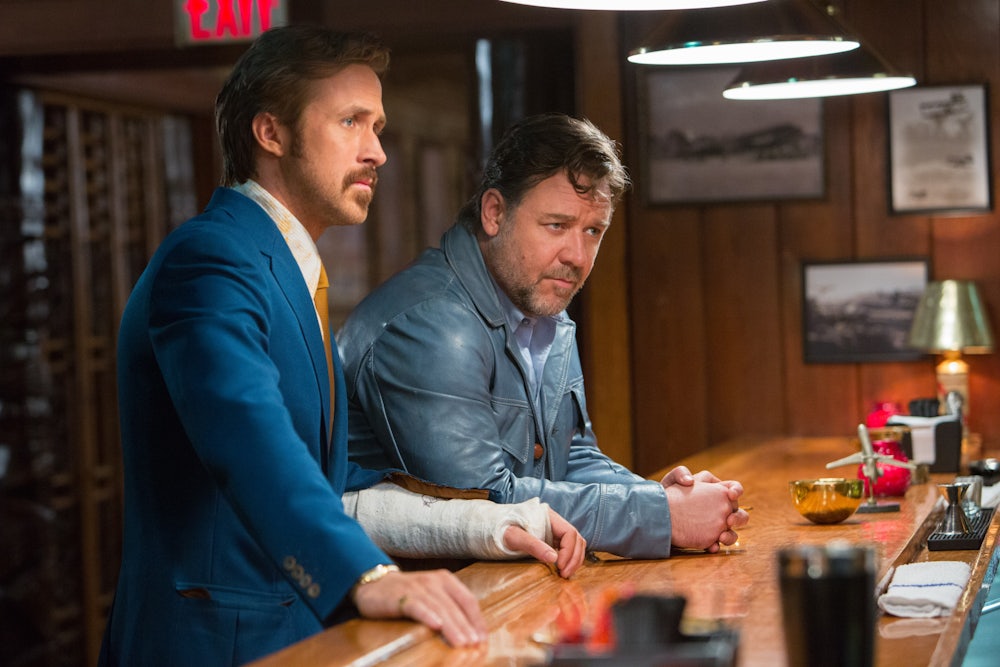If it were, say, the summer of 1988, The Nice Guys would be a big box-office hit, spurring a series of decreasingly satisfying sequels. (By the franchise’s fourth film, our heroes would get a hip new partner, or maybe a dog.) But in a summer of robots and warlocks and ninja turtles, I’m not sure how this kind of old-school mismatched-partners buddy-cop film—even one with a 1970s setting and a wry tone to remind you it’s currently 2016—is going to play. Movies like this are usually only made these days as satire: It’s as if our self-aware culture decided they were a cliché, rather than a perfectly sturdy genre. (I actually have a theory that the one-two punch of Tango & Cash and Turner & Hooch in 1989 destroyed the viability of the buddy-cop comedy—I’d be happy to expound upon this if I happen to corner you at a party some time.)
But these movies, when done well, have the appeal of a good romantic comedy. They certainly follow the same basic story arc: Meeting, Conflict, Awkward Coupling Forced Upon Them By Exterior Circumstances, Begrudging Respect, Ultimate Unity. And, like any good romantic comedy, they rise and fall on the chemistry between their leads. So the best thing The Nice Guys has going for it are two laid-back, easygoing, deeply likable performances by its stars. Gosling plays Holland March, a shambling widowed private eye who struggles with what seems to be a serious (if occasionally comical) drinking problem. Russell Crowe is Jackson Healy, a graying, hulking brute who’s paid to beat people up and not ask questions. After the two men cross paths, they team up to find a missing woman who may have made an adult film that used its dialogue to expose a conspiracy involving the Department of Justice, the city of Detroit, and the American auto industry. (Remember: the film takes place in 1977.) As everyone involved in the porno begins to be killed off, March and Healy, with some dangerous assists from March’s 12-year-old daughter (Angourie Rice), try to uncover the mystery, find the girl, and—of course—get paid.
The movie is written and directed by Shane Black, who wrote the first two Lethal Weapon movies and, more recently, Kiss Kiss Bang Bang and Iron Man 3. He has this terrain down cold, and among the film’s many pleasures is just how much smarter and better written every scene is than it had to be. Black has no interest in reinventing the buddy-cop movie, or even the ’70s private-eye mystery; he’s not trying to replicate what Paul Thomas Anderson did in Inherent Vice. Instead, Black just tells us a straightforward, if occasionally confusing, cop story, with two tour guides who keep forgetting where they are or how they got there in the first place. The film plays like an homage to those old Altman ’70s movies like The Long Goodbye without feeling stuck in the past.
But again: These movies work because of their leads, and The Nice Guys has a pair I’d be happy to watch bounce off each other for another three or four movies. Crowe has the more familiar part, as the brooding brute—albeit one who’s more gut than muscle at this point—looking to be part of something worthwhile and noble for once; if you twist the timelines a bit, you can almost imagine the character as L.A. Confidential’s Bud White, 25 years later. (Kim Basinger even shows up.) But Crowe finds some whimsy in the performance, a light touch he hasn’t always possessed. He’s an actor who doesn’t always seem to be enjoying himself, but he sure seems to be here.
Gosling, though, is the real revelation. Often painted as a moody, method-y sort, Gosling is at his best when he’s being funny, and here he’s a downright riot as a screw-up who floats around half-drunk and still can’t help but be the smartest person in the room. Gosling takes a small cue from Joaquin Phoenix’s Inherent Vice performance but expands it, making it more overtly comic and more accessibly likable. Gosling is a terrific actor, but he’s never been this immensely amiable; it’s probably my favorite performance of his.
The Nice Guys gets a little too bogged down in its plot details, and it probably has two or three more characters than it needs. The movie also runs out of steam by the end and devolves into yet another dull shoot-‘em-up, courtesy of a drab hit man played by Matt Bomer. (Though I’ll confess admiration for Black’s inventive execution, particularly a scene when March and the man he’s fighting fall off a roof at the same time, to spectacularly different results.) This isn’t a reinvention of a buddy cop movie as much as it is a revival of it, a reminder of the genre’s appeals and its limitations. They don’t make movies like The Nice Guys anymore. I think you’ll be surprised by just how much you’d missed them.
Grade: B+
Correction: A previous version of this article stated in the subheadline that Shane Black directed Lethal Weapon. Black was the film’s writer.
Looking for more movie recommendations? Check out the latest episode of the Grierson & Leitch podcast.
Grierson & Leitch write about the movies regularly for the New Republic and host a podcast on film, Grierson & Leitch. Follow them on Twitter @griersonleitch or visit their site griersonleitch.com.
